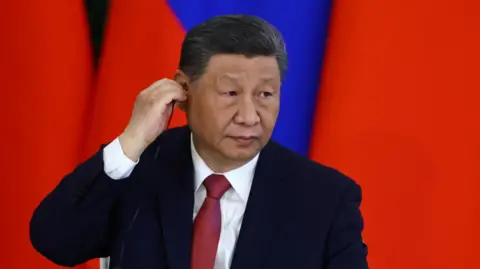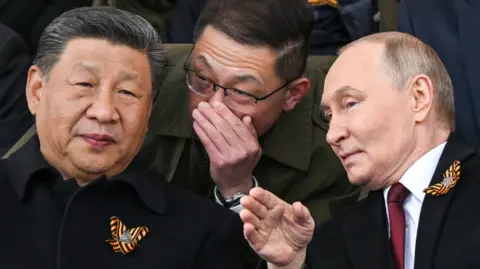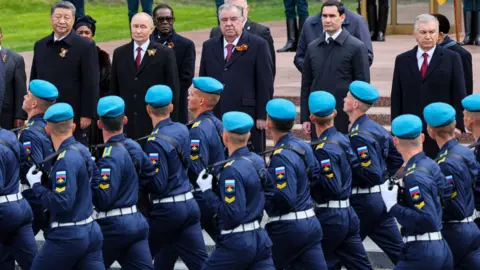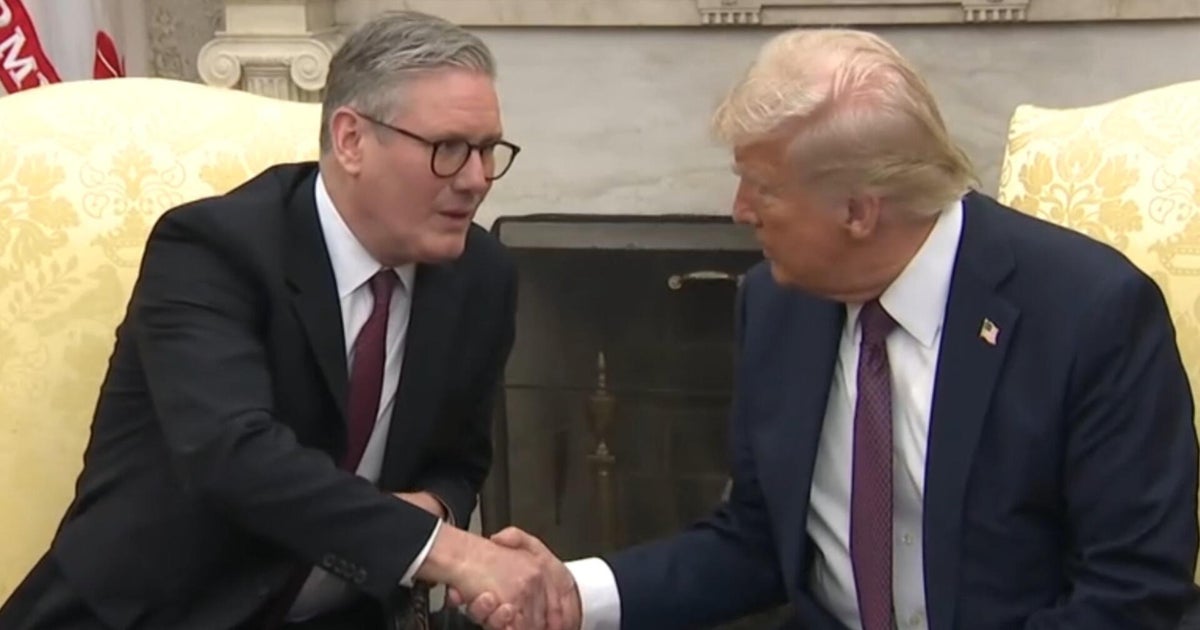Laura Bicker
China Correspondent

 Reuters
Reuters
Chinese President Xi Jinping and his Russian counterpart Vladimir Putin make it look like they're the best of friends.
Xi took his place at the right-hand side of Putin, the position of a steadfast ally, as their troops marched together on Red Square as part of Moscow's Victory Day parade.
Hours earlier, Xi described the bond between the two countries as "unbreakable" and added that Russia and China should be "friends of steel".
This is Xi's 11th visit to Russia since becoming president in 2013 and the two leaders have met on more than 40 occasions.
Putin has already announced plans to visit China in the autumn and the two leaders have even, in the past, shared a rare public hug.
But there is more to this relationship than meets the eye.
"We see a lot of exchanges between the two men and patriotic displays of togetherness," said Mathieu Boulegue, from the Center for European Policy Analysis.
"They can be friends on one end or co-operating on one end and then ripping each other apart on others, and actually be competitors in certain aspects of their relationship.
"We get wowed by the symbolism. There's a lot of performance around this relationship. But it's interesting to look at the real substance."
In truth, President Xi is walking a very fine line. Russia is an important partner for China but Putin's invasion of Ukraine has made him an international pariah in much of the world.
Beijing needs to be careful that its friendship with Moscow doesn't isolate other prospective partners, especially as it is fighting an economic war with the United States.
China has been courting Europe for several months and stepped up its campaign after Donald Trump became US president.
Beijing has been keen to portray itself as a stable alternative global partner in contrast to an unpredictable White House in Washington.
There were some signs earlier this week that these diplomatic overtures were working.
Ursula von der Leyen, the president of the European Commission, and António Costa, the president of the European Council, exchanged messages on Tuesday with President Xi and Chinese Premier Li Qiang to celebrate the 50th anniversary of bilateral relations.

 Reuters
Reuters
China's Xi Jinping sat beside Putin in Moscow - an indication of his significance in Friday's parade
The stumbling block of any prospective partnership has been Beijing's close-knit relationship with Moscow and its economic support for Russia. China has not condemned its "old friend" for the invasion and instead calls for an end to the "crisis".
If President Xi appears to stand too close to Putin, it could cause friction with Europe at a time when it is looking for friendship.
Message to Trump
But the Chinese leader has another key message to send.
Trump's initial attempts to end the war in Ukraine had him touting his close personal relationship with Putin. It prompted analysts to ask if Washington was trying to drive a wedge between Moscow and Beijing.
Xi will want to make it clear to Trump this is not possible.
"Together, we must foil all schemes to disrupt or undermine our bonds of amity and trust," Xi wrote in a signed article for Russian media.
The Russian and Chinese leaders also described Trump's plans for a "Golden Dome" missile defence shield over the US as "deeply destabilising", and argued that it would weaponise space.
Both leaders are keen to present their vision of an alternative world order in the face of what they believe is US hegemony.
But Xi will be aware that while China is a superpower – Russia's power is now limited. This is no longer a partnership of equals.

 EPA-EFE/Shutterstock
EPA-EFE/Shutterstock
President Xi and President Putin were joined by other world leaders as they observed the military parade
The war in Ukraine has weakened Russia's economy and depleted its arsenal and army.
Western sanctions have also left Moscow far more reliant on Beijing for economic survival. They have severely weakened the Kremlin on the world stage.
"Russia needs China much more than the opposite is true," Boulegue said.
Moscow will need to "suck it up", he added.
Putin may lean into his friend as they watch the tanks roll through Red Square and they can team up when they need each other.
But behind the bold statements, the smiles, handshakes and the occasional hug, there are potential sources of discord and disharmony which could surface in the years to come.

 9 hours ago
1
9 hours ago
1










 English (US) ·
English (US) ·